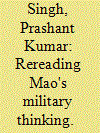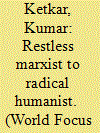| Srl | Item |
| 1 |
ID:
126357


|
|
|
|
|
| Publication |
2013.
|
| Summary/Abstract |
Although today's undergraduates may not have considered the implications of class struggle, they are generally well-versed in the intricacies of vampire lore. This article outlines how the vampire metaphor can serve as a valuable pedagogical tool for introducing students to fundamental concepts in Marxist thought. As opposed to the supernatural vampires featured in Stoker's Dracula or Meyer's Twilight saga, this approach treats capitalism as a form of economic vampirism-with the capitalist taking on the role of the vampire and the worker relegated to its prey. The article further extends the vampire metaphor and demonstrates how it can be used to teach the Marxist perspectives on class conflict, alienation, and false consciousness.
|
|
|
|
|
|
|
|
|
|
|
|
|
|
|
|
| 2 |
ID:
123304


|
|
|
|
|
| Publication |
2013.
|
| Summary/Abstract |
Although the nature of warfare has changed beyond recognition since the 1920s and 1930s when Chairman Mao Zedong penned his main military writings, his military thoughts are still a point of reference for any discussion on military thinking in modern China. Developments in warfare have superseded Mao's operational principles and tactics visualised in his three-stage warfare; however, his philosophical and political understanding of war has value that transcends time and space. The present article shows that the political and military situation in China in the 1920s and 1930s shaped Mao's military thoughts, and his military ideas were an original contribution to Marxist thought. The extent to which pre-existing non-Marxist Chinese and Western scholarly traditions of strategic thinking influenced his ideas is uncertain. Mao's military ideas continue to provide normative direction in China, with the potential of opportunistic philosophical manipulation by the government. In addition, the righteous convictions of his military thoughts continue to capture the imagination of anti-system dissenters worldwide.
|
|
|
|
|
|
|
|
|
|
|
|
|
|
|
|
| 3 |
ID:
123408


|
|
|
|
|
| Publication |
2013.
|
| Summary/Abstract |
What would have been the response of M N Roy to the disintegration of the Soviet Union and collapse of the socialist systems in Europe? Perhaps he could have said that he was long expecting that to happen. Or perhaps he could have felt sorry that a great and truly epoch making project has failed. Perhaps he would have seen in that failure a rejuvenation of the idea of Radical Humanism, which he felt, was a creative evolution of the very Marxist thought. He could have also reflected that had communism incorporated the radical humanist ideas, the tragedy would not have occurred.
|
|
|
|
|
|
|
|
|
|
|
|
|
|
|
|